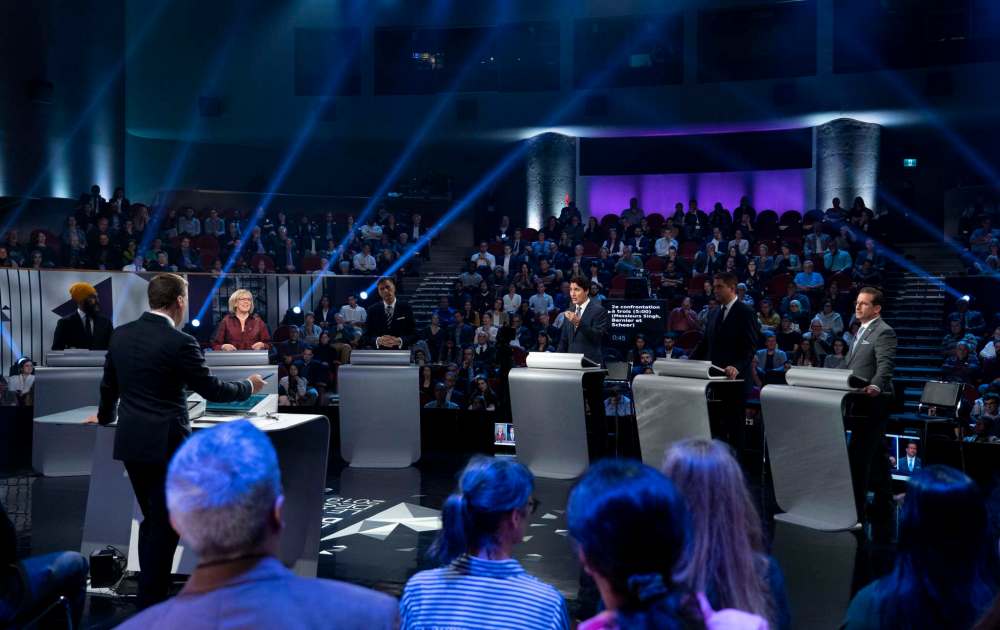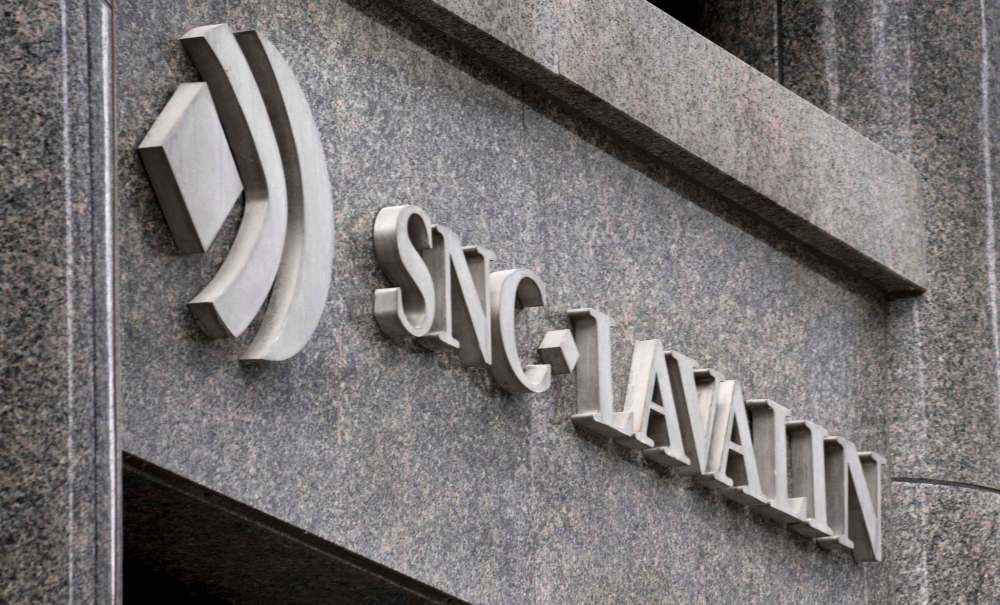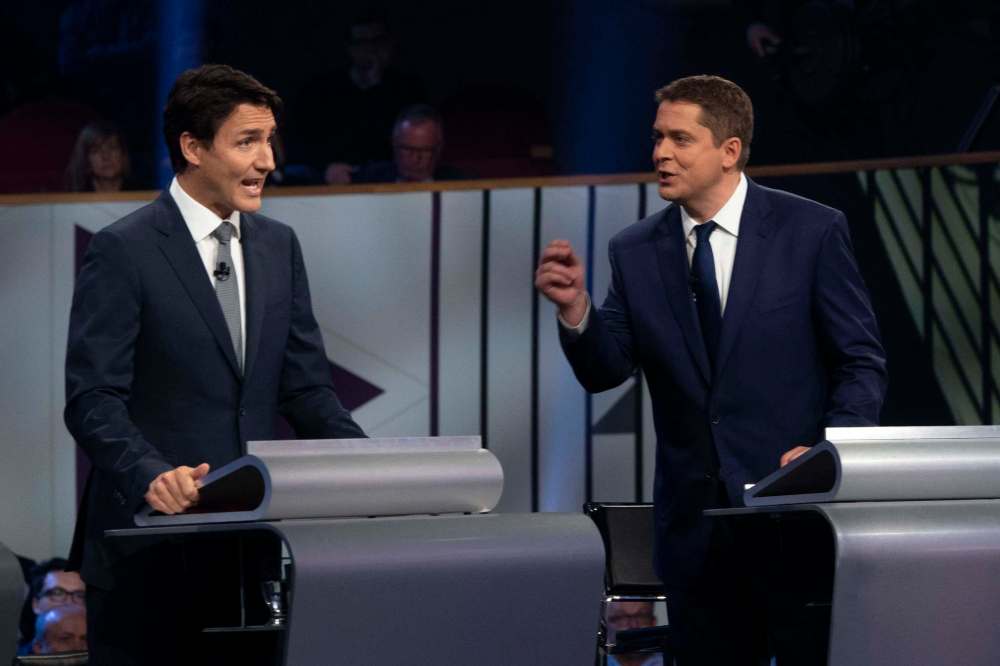Leaders on high wire between English Canada, Quebec
Advertisement
Read this article for free:
or
Already have an account? Log in here »
To continue reading, please subscribe:
Monthly Digital Subscription
$0 for the first 4 weeks*
- Enjoy unlimited reading on winnipegfreepress.com
- Read the E-Edition, our digital replica newspaper
- Access News Break, our award-winning app
- Play interactive puzzles
*No charge for 4 weeks then price increases to the regular rate of $19.00 plus GST every four weeks. Offer available to new and qualified returning subscribers only. Cancel any time.
Monthly Digital Subscription
$4.75/week*
- Enjoy unlimited reading on winnipegfreepress.com
- Read the E-Edition, our digital replica newspaper
- Access News Break, our award-winning app
- Play interactive puzzles
*Billed as $19 plus GST every four weeks. Cancel any time.
To continue reading, please subscribe:
Add Free Press access to your Brandon Sun subscription for only an additional
$1 for the first 4 weeks*
*Your next subscription payment will increase by $1.00 and you will be charged $16.99 plus GST for four weeks. After four weeks, your payment will increase to $23.99 plus GST every four weeks.
Read unlimited articles for free today:
or
Already have an account? Log in here »
Hey there, time traveller!
This article was published 11/10/2019 (2213 days ago), so information in it may no longer be current.
If you want evidence that shows just how distinct Quebec is from the rest of Canada, you need only look at the current federal election.
With 78 total seats up for grabs, Quebec has long been a key battleground for determining the eventual winner of any federal vote. Only Ontario, with 121, has more. Truly national parties understand that unless you can run the table in Ontario you need to demonstrate solid support in Quebec.
The parties also understand that Quebec requires a parallel campaign that requires leaders to say and do things they would never do in the rest of the country. To wit, the current campaign and the political gymnastics that the leaders have been forced to perform to have any chance of winning seats.

In the now-infamous, six-leader English-language debate this past week, and it’s French-language edition a couple of days later, the complexity of the Quebec dynamic was in full force.
Conservative Leader Andrew Scheer has long suggested that the SNC-Lavalin scandal will bring down the Liberals, but there has been little evidence that will come to pass. A lot of that has to do with the fact that the issue is viewed so differently inside and outside Quebec.
As many Canadians know, Trudeau broke federal ethics guidelines by attempting to influence then Justice Minister Jody Wilson-Raybould to spare Quebec-based engineering firm SNC-Lavalin from facing a criminal prosecution on bribery and corruption charges. A conviction would blacklist it from federal government work for a decade, and threaten the viability of the firm.
Advocates for SNC-Lavalin, including Trudeau, maintain that there is no real justice in punishing a firm — and its employees across Canada — for past misdeeds of a few senior-level leaders. In both debates, Scheer had Trudeau in his sights on SNC-Lavalin, calling him a “phony and a fraud” and inviting voters to join him in burying the Liberals once and for all.
Unfortunately for Scheer, this line of attack does not translate well in Quebec, where it’s a story about a threat to an iconic company that employs thousands in the province. Bloc Quebecois Leader Yves Francois-Blanchet has become an unexpected ally of Trudeau’s by accusing Scheer of punishing Quebec workers to indulge in a partisan attack.
And there’s the rub. If you want to be competitive in Quebec, you simply cannot portray SNC-Lavalin as a story about a corrupt company and an equally corrupt government. A majority of Quebecers prefer to see the firm pay fines for its crimes and not be subjected to prosecution. As a result, despite Trudeau’s ethical transgressions, the Liberals appear likely to win the most seats in Quebec, a reality that will make Scheer’s job of unseating the Liberals extremely difficult, if not impossible.
The same dynamic plays out with other issues.

Bill 21, the law that makes it illegal in Quebec for public servants to wear religious vestments or symbols while on the job, is another debate designed to confound truly national political parties. Outside Quebec, there is a high-degree of disapproval over the bill; in Quebec, it is supported by a strong majority. That has prompted all kinds of fancy footwork from the federal leaders.
Almost all federal parties oppose Bill 21, but only Trudeau has said a government he leads might actually intervene in an upcoming Quebec Court of Appeal hearing on the constitutionality of the law. Others, including Scheer and NDP Leader Jagmeet Singh, have refused to support intervention largely out of a concern about offending the Quebec majority that supports the law.
And then there are issues where the political proclivities of multiple regions come into play, issues such as pipelines.
Quebecers are strongly opposed to allowing Alberta oil and gas to flow through its province via pipeline. Opinion polls earlier this year show that a strong majority of Canadians in every province except for Quebec think the lack of pipelines is a crisis; in Quebec that view is decidedly minority position.
That polarization is a problem for all national parties that must also pay support to the whole concept of pipeline expansion to placate the powerful oil-and-gas lobby, as well as voters in provinces where fossil-fuel extraction, refinement and transportation is a major employer.
This election is a strong reminder that obtaining a majority mandate in any Canadian federal election is a delicate and sometimes dangerous balancing act. There is no national consensus on most issues. In fact, regional disparities are typically so profound, it is simply impossible for political leaders to speak with one voice and express only one position.
That undeniable Canadian realpolitik is certainly to the detriment of the electoral system on the whole and threatens the legitimacy of election results. But then again, it also speaks to the importance of political leadership that has the skill to forge national solutions for the most contentious issues.

National solutions require an agreement among political parties, and voters, to agree to disagree on certain issues while compromising on others.
It’s a beautiful idea, but it seems to be as remote a possibility as SNC-Lavalin getting a government-awarded contract to build a pipeline through downtown Montreal. Which is to say, remote verging on impossible.
dan.lett@freepress.mb.ca

Dan Lett is a columnist for the Free Press, providing opinion and commentary on politics in Winnipeg and beyond. Born and raised in Toronto, Dan joined the Free Press in 1986. Read more about Dan.
Dan’s columns are built on facts and reactions, but offer his personal views through arguments and analysis. The Free Press’ editing team reviews Dan’s columns before they are posted online or published in print — part of the our tradition, since 1872, of producing reliable independent journalism. Read more about Free Press’s history and mandate, and learn how our newsroom operates.
Our newsroom depends on a growing audience of readers to power our journalism. If you are not a paid reader, please consider becoming a subscriber.
Our newsroom depends on its audience of readers to power our journalism. Thank you for your support.
History
Updated on Friday, October 11, 2019 7:09 PM CDT: Adds photos













